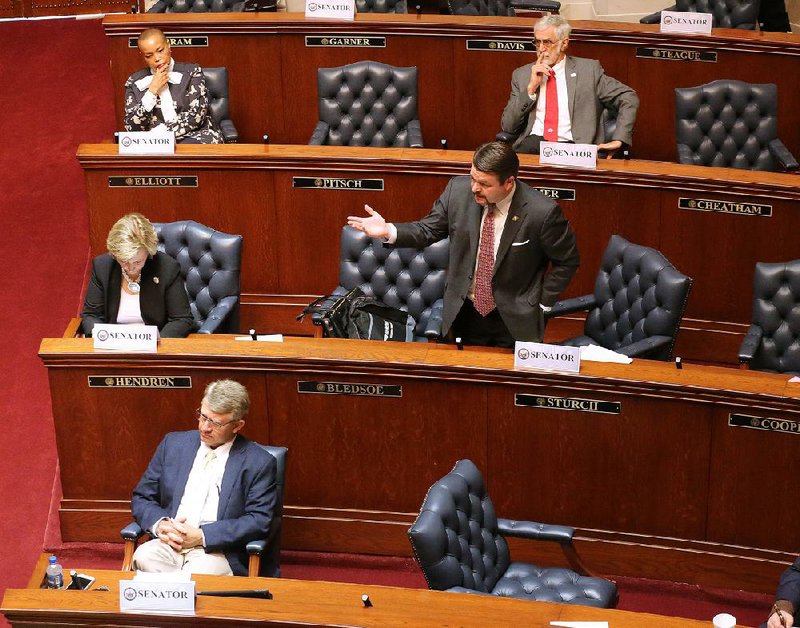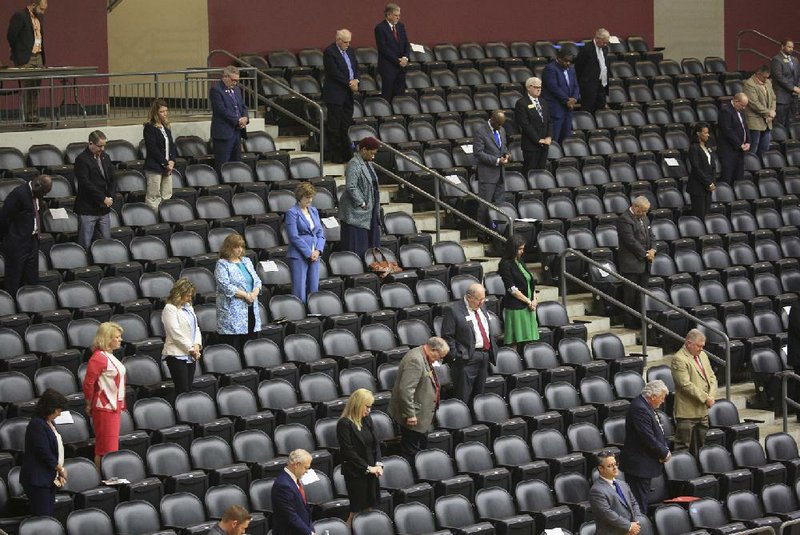A special session of the Arkansas Legislature began Thursday as lawmakers hastily gathered in two locations -- the Senate in its chambers and the House in a college basketball arena -- to consider making use of $173 million in surplus funds in response to the coronavirus pandemic.
Gov. Asa Hutchinson issued the call for a special session Wednesday, after legislative leaders said they had reached an agreement to create a "rainy-day" fund from which to fill gaps in the budget caused by the virus's economic impacts, or to use in fighting the spread of the virus.
The session is scheduled to conclude shortly after midnight today, fulfilling the three-day constitutional minimum length for a special session.
To protect lawmakers' health while meeting in the midst of a pandemic, a number of precautions were taken to keep legislators at a distance from one another, hence the use of a basketball arena for the 100-member House.
[CORONAVIRUS: Click here for our complete coverage » arkansasonline.com/coronavirus]
Both chambers also passed rule changes that will allow for the expanded use of voting by proxy during this special session and the biennial fiscal session that starts April 8.
"We face some unprecedented challenges as a state," said House Speaker Matthew Shepherd, R-El Dorado. "It has become necessary to address one of those challenges, which comes in the form of the loss of revenue."

Hutchinson said this week that state tax revenue losses resulting from slowing business and laid-off workers, and his extension of the state's individual income tax filing and payment deadline from April 15 to July 15 are expected to cost the state $353.1 million in fiscal 2020. The fiscal year ends June 30.
Both chambers advanced bills to help tackle the shortfall.
[Gallery not loading above? Click here for more photos » arkansasonline.com/327session/]
SPREAD OUT
At the Jack Stephens Arena on the campus of the University of Arkansas at Little Rock, 90 representatives filed into grandstands built for 5,600 spectators. No more than two legislators were seated in each row, so that no one had to step over another to get up and speak at a microphone stationed near the out-of-bounds line.
Upon entry, legislators, staff members and members of the media were handed tiny bottles of hand sanitizer -- reinforcements for the units of automatic dispensers stationed around the arena -- and had their temperatures checked by medical staff members. At least one lawmaker wore a face mask through part of the proceedings.
"I think it's needed," said Rep. Jeff Wardlaw, R-Hermitage. "With all of us going to a hundred different directions among the state of Arkansas, we don't want to be responsible for carrying it back to somewhere that it's not."
In the Senate's normally cozy chambers, about 20 senators sat with empty chairs between them while the rest of their colleagues sat in the galleries above, and in nearby Senate offices, the Capitol Hill apartments northeast of the Capitol building and elsewhere.

"We all are living in times that are unprecedented and when we say extraordinary session, I think this may be the most extraordinary session any of us will ever participate in because these are extraordinary times," Senate President Pro Tempore Jim Hendren, R-Sulphur Springs, told his colleagues.
Sixteen lawmakers in both chambers were not in attendance Thursday. That list included the House's oldest member, 78-year-old Rep. Jim Wooten, R-Beebe, and one of its youngest members, 29-year-old Rep. Grant Hodges, R-Rogers.
"I didn't want to take the risk of getting around that many people, even with them all spread out," said Wooten, adding that he had recently undergone surgery and had a weakened immune system.
Rep. Nelda Speaks, R-Mountain Home, said she planned to cast her vote through a proxy. She was concerned about spreading the virus to her husband, who she said has underlying health issues.
"We were really concerned about that," Speaks said. "After speaking to medical folks, they advised me not to [attend]."
Shepherd said he expected more members to take advantage of new House rules allowing for expanded proxy voting during the remainder of the public-health crisis.
"That's fine, that's what it's there for," he said.
TWO BILLS
The House and Senate today will consider identical bills that would create the Covid-19 Rainy Day Fund to use $173.6 million in unallocated surplus funds. The governor could tap the rainy-day fund to fill gaps in the state budget and pay for unexpected needs spawned by the pandemic.
Hutchinson spoke to the House about the challenge the state faces: "[I]n two weeks, the world in which we live has changed. Our covid-19 cases have increased from zero to over 300. We have had two deaths. School buildings are empty. Education is online. Hundreds of small businesses have been closed and 20,000 people in Arkansas have lost their jobs," the governor said. "We are innovative in our work, we are supportive of our neighbors and we are determined to win over this invisible enemy." After his remarks, state officials said a third person had died of the virus.
House Bill 1001 is sponsored by Shepherd, while Senate Bill 2 is sponsored by Hendren.
With each side acting as a Committee of the Whole -- instead of sending the bills to a standing committee -- the House voted Thursday to recommend approval of HB1001, and the Senate did the same with its bill. But first, the Senate defeated an amendment proposed by Sen. Jimmy Hickey, R-Texarkana, to SB2.

Both bills will be considered by separate chambers today and then by the opposite chambers after midnight.
Under the legislation, the covid-19 fund also could include other any revenue provided by law, and any fund or fund account transfers.
The measures would require the state's chief fiscal officer to use the fund on spending authorized by the General Assembly and "to offset general revenue reductions, funding needs and unanticipated needs created by the covid-19 crises."
"We find ourselves in a crisis, and that crisis is going to demand that we have the ability to act quickly and that we have the ability to spend the funds in ways that we might not have anticipated a year and a half ago when we did the budget hearings," Hendren said.
Under these bills, the release of any money from the covid-19 fund would require approval of at least two of three legislative leaders in both the House and Senate.
This approval would come either electronically or in writing.
The House leaders would be at least two of the following three people: the speaker, the Republican leader and Democratic leader, or their designees.
In the Senate, the officials would be two of the following three people: the president pro tempore, and the Republican and Democratic leaders, or their designees.
The bills explain how approval would be given:
"In the event the majority party leader or the minority party leader is not available within two hours after the notification [of the funding request] has been given or has recused, the Speaker of the House or the President Pro Tempore of the Senate shall contact the non-responding majority party designee or non-responding minority leader designee and the designee shall either be immediately available or is deemed to vote for approval of the release of funds from the Covid-19 Rainy Day Fund."
Hendren told senators that "some of these decisions literally may save lives if they are not made within a matter of hours."
The Legislature will be told about requests for using the funds, the approvals and a summary of how the money was spent, he said.
Hickey proposed amending Hendren's bill to require the prior approval of the Legislature's 20-member Joint Performance Evaluation and Expenditure Review Committee for the release of funds. Hickey's amendment would have added the speaker and president pro tempore as voting members to the committee.
Hickey said the committee would consider requests for use of the rainy-day funds in a conference call, electronically by email and/or in a regular meeting, and the meeting would be held within three hours of notification of the request for funds.
With five senators not voting, the Senate voted 13-17 to reject Hickey's proposed amendment.
LEFTOVER FUNDS
Under the bills, on June 30, the last day of fiscal 2020, the chief fiscal officer would transfer any remaining funds in the covid-19 fund back to the general revenue allotment reserve fund, which is the repository for unallocated surplus funds.
Hutchinson said the special session is necessitated by his administration's $353.1 million cut to the general revenue budget to $5.38 billion in fiscal 2020.
The Republican governor has attributed the budget cut to a projected reduction in state tax collections from job layoffs and business slowdowns in the next three months, as well as from moving the April 15 individual income tax filing and payment deadline to July 15 to mirror the federal government's extension of these deadlines. The layoffs, business slowdowns and filing changes are because of the impact of the coronavirus pandemic.
Hendren said that moving the April 15 filing and payment deadline for individual and corporate income taxes to July 15 "would have been about a $500 million hit [to the state budget] and you could not find a way to absorb that."
He said Senate Revenue and Taxation Committee Chairman Jonathan Dismang, R-Searcy, suggested moving the individual income tax filing and payment deadline to July 15 and leaving the corporate filing and payment deadline on April 15, and "it turned out that is much more affordable," to the state.
A Section on 03/27/2020
